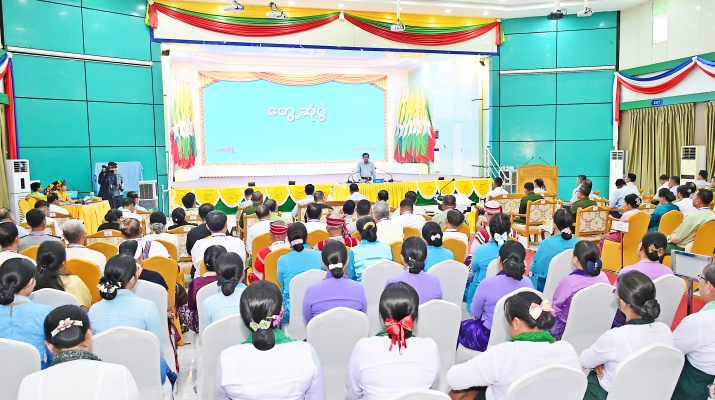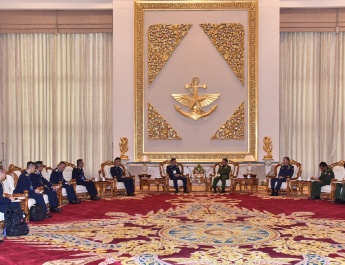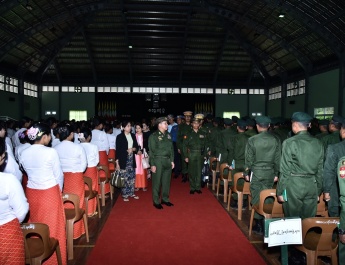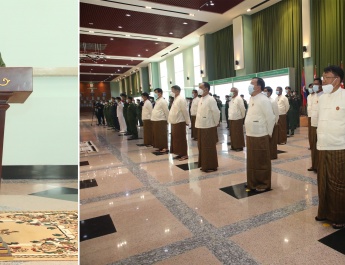Nay Pyi Taw November 15
Acting President of the Republic of the Union of Myanmar, Chairman of State Security and Peace Commission, Senior General Min Aung Hlaing met Kayin State level departmental officials and local elders in Hpa-an, Kayin State this morning and discussed regional development.
Also present were SSPC Secretary Joint Executive Chief General Ye Win Oo, union ministers, senior military officers from the Office of the Commander-in-Chief, Kayin State Chief Minister U Saw Myint Oo, the South-East Command commander, deputy ministers, MSME entrepreneurs and local national races.
The chief minister reported on ongoing preparations for the coming election, points of the state, seizure of illicit goods and ongoing antiillicit trade operations, agricultural activities and efforts to increase per acre yield, livestock breeding, fish/prawn farming, courses and knowledge sharing programs to boost production, local food sufficiency, MSME development undertakings, tourism in the area, local and foreign tourist arrivals, development undertakings for education, health and sports in the state, deportation and transfer of illegal foreigners in Kayin State, aid for temporarily displaced persons, and planned solar-power projects.
Local elders and entrepreneurs presented a report on food and other necessary aid provided by the Union government and Kayin State government for victims of floods triggered by Thanlwin River in Hpa-an, the need to carry out drainage activities to prevent further river floods in Hap-an, extra loans for livestock breeding, provision of inputs for paddy cultivation, efforts for further development of hotels and tourism business, more financial support needed for ethnic language teachers.
Kayin State level officials presented a supplementary report on dredging operations at necessary places to alleviate Thanlwin River floods and planned regulating dams for flood control in Hpa-an.
Concerning the reports, the Senior General said as regards the solar-power generation, the electricity demand of Hpa-an and other towns must be calculated. Floods will occur more at the time when upper areas are receiving a lot of rain and when there are high tides.
Reactivation of the Hatkyee hydropower project in Hpa-an area will help control floods. The project will generate electricity for the area and reduce natural floods to a certain degree. Hence, local people should collectively render a helping hand towards the success of the project. As Kayin State is a pleasant place, local and foreign tourists are showing interest in visiting it. The place needs extra progress, and the visitors should be attracted with activities to beautify the areas in and around Hpa-an and fresh and clean local cuisines. Tourism is a beneficial business for a region as its income is high. The collective involvement of the people is required as its extra development calls for area peace and stability.
Union ministers explained legal plans to permit land for solar-power generation businesses, field studies to prevent flood in Hpa-an, provision of extra financial assistance from regional development funds required for agricultural activities in accord with the procedures, provision of inputs for paddy cultivation, success in growing robusta coffee or lowland coffee in Kayin State, need to develop pepper cultivation, ongoing assistance for success of farming business, utilization of farmland in accord with the law, input supply for cultivation activities, upgrading of roads and other necessary supports for rural development, Myaseinyaung project for rural economic development, opening of mechanical and agricultural schools, activities to increase forest areas in Kayin State and other sectors.
In his speech, the Senior General expressed his wishes for Kayin State to remain peaceful, pleasant, and stable. The Government continues to under-take efforts for the development of Kayin State and that elections will be held in the near future. After the election, the country will be administered by the elected representatives together with the new government. The nation will continue moving forward under the multi-party democratic system desired by the people, and that a sound political path must be implemented through capable elected representatives. Just as development can be achieved in regions that enjoy stability and peace, it was emphasized that no political system can bring progress to areas where stability and peace are absent.
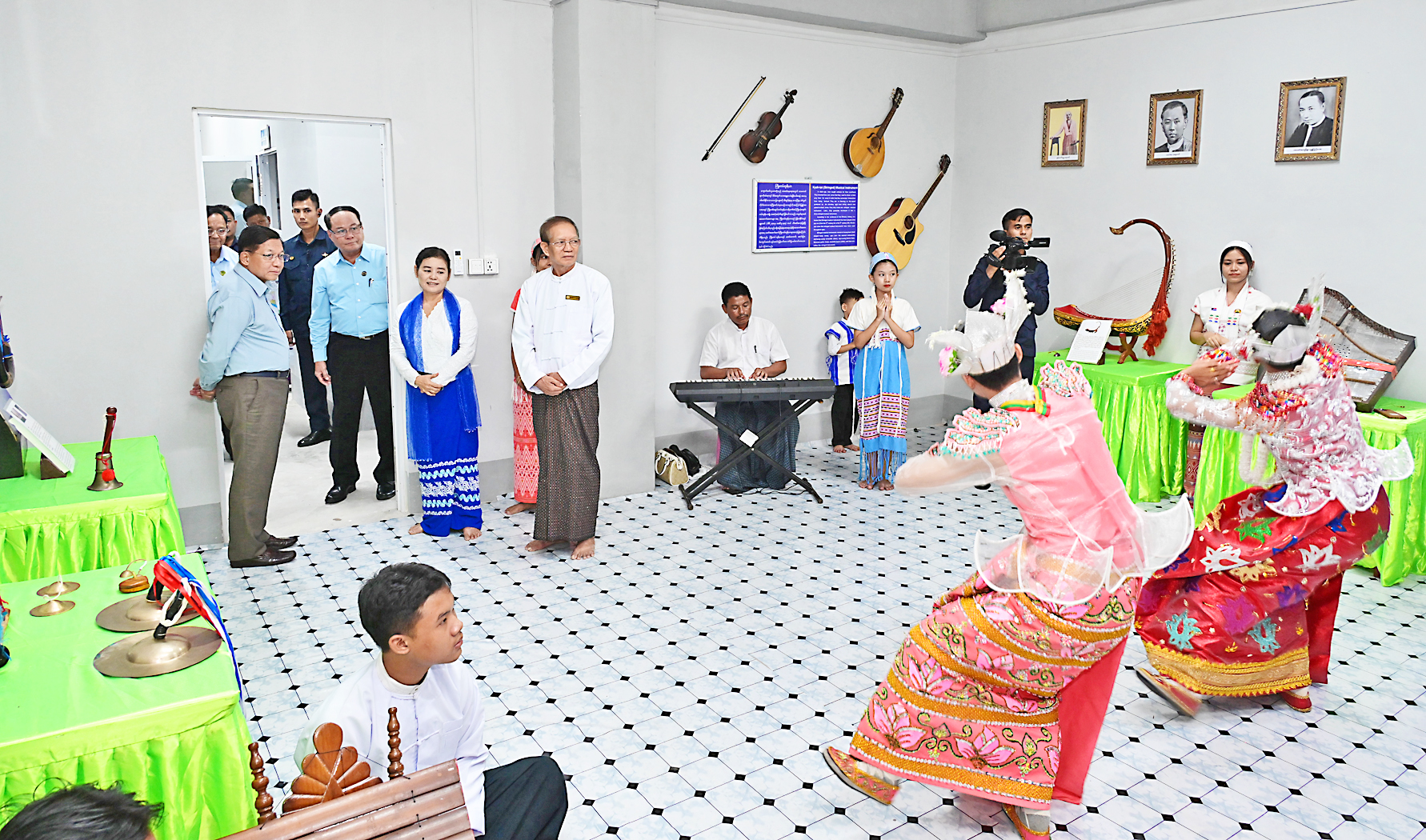
National development requires stability and peace, and that residents of each region must also make genuine efforts in their work. Likewise, improved education is essential. When the National Peace and Security Commission was formed, the mottos “Let us encourage production for prosperity of the Nation, Let us ensure education sector for the development of the Nation, Let us protect our environment for the prosperity of the Nation” were adopted. A region or a country can develop only when people actively engage in productive work. Carrying out manufacturing and production activities benefits both the public and the State. To conduct such activities, technical skills are necessary, and to acquire technical skills, a strong foundation of class-room education is required. Therefore, the Government is working to improve educational standards. Training courses are also being conducted to help those with lower educational levels gain skills that can be applied in production-related work.
Many students in the country sit for the university entrance examination but do not pass. Consideration is needed on how these students can be effectively utilized for the benefit of the nation. Therefore, in consultation with relevant officials and experts, plans are being made to open polytechnic schools where students can receive training in their respective fields and enter the workforce accordingly.
Every developed country is rich in educated people and has a population with nearly full completion of higher education. In Myanmar, however, completion rates at the primary, middle school, high school, and higher education levels remain comparatively low. Kayin State has many job opportunities, and that residents need to engage in these opportunities genuinely and in a systematic manner.
In Kayin State, agricultural output per acre still needs to be increased to meet target goals. Achieving these targets would significantly contribute to regional food security and local income growth. For the country’s currency value to rise, economic development is necessary, which requires increasing production of goods and exporting them abroad. Only then will domestic financial circulation improve and the economy develop. There-fore, efforts must be made to promote and expand production within the State.
For a country to achieve development, it requires strength in political leadership, economic capacity, and defence capability. Strong political leadership ensures strong economic performance, and strong economic performance, in turn, enhances defence capability. Since a robust economy is an essential sector for any country, collective efforts should be made to strengthen the nation’s economic capacity.
Much of the farmland in Kayin State is still covered with water, which creates difficulties for timely planting of winter crops. Therefore, measures will be explored and implemented to reduce water coverage. Successful shrimp farming in Kayin State can be further expanded, bringing significant benefits to the region. Similarly, developing livestock, fish, and egg production to meet regional needs will help ensure fair market prices for meat, fish, and eggs.
In Kayin State, efforts are needed to increase learning of student in grades. In Myanmar, student progression is still relatively low. Supporting education is essential for both regional and national development. Those who are unable to complete higher education should also be provided with opportunities to gain employment. Training programs should be established to enable existing human resources to work effectively in the workforce. Vocational, livestock, and industrial high schools are being opened in various districts to provide such education. These measures will greatly support the country’s agricultural and livestock production. By improving production, output levels will increase, raising the income of individual farmers. Therefore, all efforts should be made collectively in Kayin State to enhance educational development.
Since Myanmar gained in-dependence, Kayin State has experienced disruptions to peace and stability due to armed conflicts, affecting both residents and the State itself. Those responsible for under-mining stability within the State are identified as armed groups operating in the region. Only with peace and stability can education be effectively provided, public health services be delivered, and regional development projects be implemented. Therefore, residents of Kayin State are urged to use various means to protect and maintain peace and stability. The Government is actively addressing actions that disrupt stability in Kayin State. Near the Myanmar–Thailand border at the KK Park area, Tatmadaw is taking measures to eliminate online financial fraud and online gambling operations, carrying out these actions as a national duty to ensure they are fully resolved.
It has been announced that a free and fair multi-party democracy general election will be held in the near future. For security reasons, the election will be conducted in three phases. Preparations are underway to enable voting using Myanmar Electronic Voting Machines (MEVM), which prevent electoral fraud. Preparations have been made to prevent fraud and to allow votes to be cast. When practicing a political system based on democracy and federalism, a federal system suitable for our country must be implemented; it is necessary to practice a region-based federal system, not a people-based one. We are working to ensure that the election we hold is a dignified one. Therefore, all those eligible to vote need to cast their votes. Consequently, since the election is the foundation for establishing our country’s proper political system, Kayin State needs to work for the success of the election.
When voting, it is necessary to be able to choose those who can genuinely represent the interests of the region, work for regional development, work for the benefit of the nation, are willing to work for the state’s interests in collaboration with officially formed state organizations, have the desire to protect our race, religion, indigenous culture, and traditions, and can uphold and protect Our Three Main National Causes.
Regarding agriculture, it was noted that in our country, both highland coffee and lowland coffee (such as Robusta) are cultivated and thriving. The coffee produced in our country is an export commodity for inter-national markets. Therefore, by promoting the cultivation of viable lowland coffee within Kayin State, regional income can be increased. If lowland coffee is cultivated as an intercrop in existing agricultural plantations in the state, such as those for mango, rubber, durian and betel leaf, it will be beneficial for the region.
Since bamboo is abundant in Kayin State, bamboo-based handicrafts and pulp can be produced. The ability to produce bamboo pulp can reduce the need to import paper from abroad. Regarding rubber cultivation, because rubber produced in our country is being illegally exported abroad, the state is suffering losses. In rubber production, it is necessary to produce with quality standards, and efforts must be made to strive for the production of bicycle and motor-cycle tires based on rubber within the state.
Regarding pepper cultivation, if it is grown as an intercrop in garden lands, it will increase regional income. Increased income from manufacturing industries will improve cash flow and lead to better regional economies. Therefore, it is necessary to work diligently. For such work to be possible, stability and peace are essential, and promoting education is indispensable, it was stated.
Subsequently, the Senior General attentively toured and inspected the products from Micro, Small, and Medium Enterprise (MSME) businesses displayed within Kayin State and gave necessary instructions regarding the presentations made by responsible per-sonnel.
Later, the Senior General and party arrived at the Kayin State Youth Center. In the meeting hall, the State Minister for Social Affairs explained matters related to the center’s construct-ion, the opening of training courses, the status of delivered technical lectures, and future plans to be implemented.
In response to the presentat-ion, the Senior General stated that the center needs to be utilized effectively. Training that directly benefits Kayin State and teaches skills directly applicable in the workplace is
necessary. As youth are the ones who will inherit and carry the responsibilities of adults in the future, it is necessary to provide them with foundational knowledge and skills they should know and acquire, matters of national interest, and leadership skills. He instructed that efforts should be made to help them develop good habits of living in a disciplined manner and work-ing with good understanding.

Afterwards, the Senior General and the entourage inspected activities within the Youth Center, including youth practicing indoor games, con-ducting youth discussions, learning homemaking skills, receiving music lessons in the music room, attending painting classes, receiving computer technology instruction, and youth reading and studying in the library. They also toured the bedrooms and dining hall. After inspection, they gave necessary instructions based on the reports from responsible personnel.
Following that, the Senior General and the entourage toured and inspected the compound of Hpa-an University and within Hpa-an town by motor vehicle.
Later, the Senior General visited the construction site of the Zwekabin Indoor Stadium in Hlakamyin Kawt Thit. In a briefing room, a responsible person explained the status of the stadium’s construction progress by fiscal year, the status of the layout and construction incorporating various rooms, the types of sports that can be played, and the status of ongoing work.
In response to the presentation, the Senior General instructed that the construction of the stadium must be carried out systematically, ensuring compliance with set standards and specifications, and gave guidance on other requirements.
Aafterwards, the Senior General toured the construction site of the Zwekabin Indoor Stadium and gave necessary instructions regarding the reports from responsible personnel.


